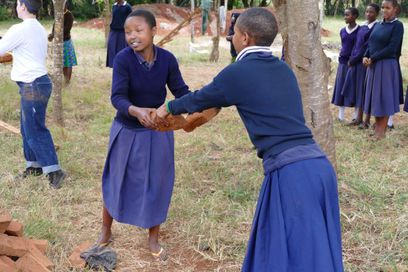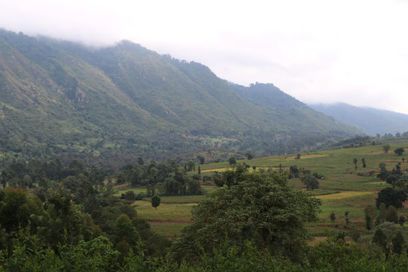A typical day of a Karimu volunteer in Tanzania
The clouds are clearing above the morning African sky, revealing baobab trees among smoking chimneys on the Ayalagaya horizon. As we make our way among local children and villagers plowing, we find a new path to the Ayalagaya school, taking a shortcut through fields of maize and beans.
Getting ready for another workday at the school, I realized for the first time how I’ve never really done a real hard day of manual work in my whole life. Among the experienced local workers, the work of ten “westerns” like me could easily be replaced by one of them. Yet our presence in the community finds both us and them motivated, working together towards a common goal of building something to which we have mutually contributed and which we’ll maintain together.

We grab the shovels and gloves and start moving soil around to landscape the area that has been excavated by the fundis, i.e. workers of the local community. The day is still young when Eric, a local boy with short hair and a bright smile, barely eight years old, joins us to help carry soil with the only wheelbarrow we have in our possession. The pupils at the school classes are watching us as we go for water breaks, waving and smiling at us. To them, the progress being done at their school will be a happy and emotional memory as they grow up. By the evening the landscape is looking beautiful.
Our challenge is nature. Shoveling through an anthill and finding big black African warrior ants. Poisonous vegetation that we don’t step on. Bees on a tree whose roots we’ve been throwing dirt on who don’t enjoy being disturbed by our vibrations. The constant burden of having to go back and forth from the work side to purify your water, even when it comes from the tap.
By night time, we’re back at the Institute, and the high-pitched soft sound of an Ukulele on one side and the voices of the singing women at the kitchen can be heard filling the dining hall. The conditions here are good - we’ve got a couple of hours of electricity, cold showers, proper squat toilets, our malaria pills. We spend our few moments after dinner discussing today’s progress and tomorrow’s plans. The cartography of the local villages is taking tiring long walks by the team, but is progressing well, and will soon have the villages mapped. Art classes at the schools taught by Karimu and local educators are enjoyed by the children. And Dr. Susan’s work in educating midwives at the clinic on baby delivery is nothing short of absolutely necessary.

After the lights turn off, I take a walk, watching the starlit sky. They say the stars are brighter than anywhere on earth when you’re near the equator. Disconnected from technology, alone in the night but constantly surrounded by the kindness of the Swahili culture, my body aches from the work, yet I have not felt so relaxed in a very long time. I make my way to bed. Under a mosquito net, my dreams are only filled with the work we’ll do tomorrow.


